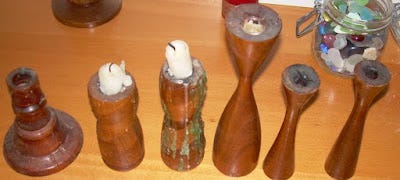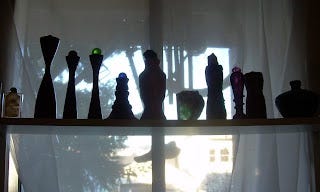Los Angeles declares itself an immigration 'sanctuary' — “The move is likely to put the city on a collision course with the incoming Trump administration, which has vowed it will begin a large-scale mass deportation effort from the very beginning of the administration.” (BBC)
This could be the first indication that a resistance movement to Trump’s authoritarian regime may be developing. If it is, what L.A. did may spread city to city and state to state.
Stay tuned.
Of course I should be trying to remain neutral about all of this. That's what we, as journalists, always try to do. Until, that is, the moment arrives when in good conscience, we cannot avoid taking a stand.
And this is that moment. One of JFK's favorite quotes comes to mind: "The hottest places in Hell are reserved for those who in time of moral crisis preserve their neutrality."
The saying is sometimes ascribed to Dante; it may simply be apocryphal. Whenever a quotation like that comes to light, I like to think of it as received wisdom from ages past.
Most such pearls of wisdom come via our oral traditions, since writing covers only a portion of our time here on earth.
And when it comes to oral memory, I do have my own peculiar twist.
Where I grew up, the public schools placed kids into tracks, one of which was College Prep, and that's where I was tagged. My main goal in school at that time was simply to escape notice as much as possible. I rarely spoke out in class, hated when I had to give speeches, and kept a close watch on the clock for closing time.
For their non-academic classes, the girls were all sent to Home Economics while we went to Wood Shop. No exceptions. But working with wood didn't catch on with me; I bungled whatever candlestick or coaster we were expected to be able to create and probably flunked as a result.
Luckily, Shop didn't count toward your GPA, so it didn't prevent me from prepping for college.
Honestly, the main thing I remember about high school is how much my mind wandered; I rarely tuned into the formal proceedings because my brain was always drifting far, far away.
In retrospect, there were a few practical skills it might have been nice to learn, like (1) how to type and (2) how to take readable notes. But I didn't learn either one.
And I can't to this day. How, you may fairly ask, did I ever succeed as a journalist?
It's a good question, because I rarely used a tape recorder during interviews, either. My best guess is that I developed a very good memory for what people say and how they say it. Call it my own oral tradition.
Anyway, when today's professional reporters interview you, they often will do a soundcheck part way through, just to make sure their recording device is working properly. If it isn't they have to start over again. (BTW I don't know how to operate a recording device properly. I have issues with buttons.)
One time recently when I was the subject of an audio interview, the device failed to record my words. I surprised the interviewer by simply repeating them word-for-word the second time. She looked at me with a startled expression, one I've long become accustomed to -- that I must be some kind of freak.
It is oddly ironic, however, that I never learned to type or take shorthand, because my father could do both expertly, and unlike me he grew up on a farm. His typing skills led him to a seat as a witness to history, as he was one of the U.S. military's stenographers taking notes at the Nuremberg War Tribunal.
I never was much good at learning things from my Dad, with the exception of how shockingly horrible the Holocaust had been to a boy who grew up on a farm outside London, Ontario.
Plus my Dad was really good working with wood. We have his candlesticks carved from rare woods as proof of that.
What my kids will inherit from me, besides those candlesticks, are words. Millions of words
.
(This essay is from 2020.)
HEADLINES:
Ukraine strikes Russia with US-made long-range missiles for first time (Financial Times)
Trump ignores transition rules. It’s a ‘hostile takeover,’ ally says. (WP)
Trump Has Not Won a Majority of the Votes Cast for President (Nation)
Trump claims he has an ‘unprecedented’ mandate. Experts say it’s actually very small (Independent)
Trump Picks Howard Lutnick as Commerce Secretary (WSJ)
House Ethics chair: Panel’s decision on Gaetz report won’t be influenced by Johnson (Politico)
Manhattan DA agrees to postpone Donald Trump’s sentencing in hush money case but opposes dismissal (CNN)
Trump picks Mehmet Oz to serve as Medicare and Medicaid services administrator (WP)
Trump taps Linda McMahon as Education secretary, a pro-wrestling mogul with little school experience (LAT)
Trump vows to use US military for mass deportations (BBC)
The industries that could be hardest hit by Trump's immigration crackdown (Axios)
Trump's threats of mass deportations lead to hard discussions for families (NPR)
What would Robert F. Kennedy junior mean for American health? (Economist)
Trump picks former congressman Sean Duffy to lead Transportation Department (WP)
Jeff Bezos Cracks Down on the Washington Post (New York)
Saudi Arabia Is a ‘Wrecking Ball’ in Global Climate Talks (NYT)
The upcoming housing battle that could roil mortgage costs even more (WP)
Fossil from Germany unlocks history of ancient flying reptiles (Reuters)
Google Gemini can remember things now (Verge)
How AI Could Help Bring Down the Cost of College (WSJ)
Tales of 19th-Century A.I.: Don’t Fall in Love With a Singing Robot (NYT)
Want to speak Italian? Microsoft AI can make it sound like you do. (WP)
Trump Locks Bathroom Door So Elon Musk Can’t Follow Him In (The Onion)


No comments:
Post a Comment